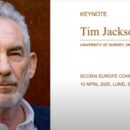
‘System change, not climate change’ is the mantra for a new politically-charged ecological activism. In the wake of two key economic conferences, CUSP director Tim Jackson reflects on what this means for the financial and political stability of Europe.
. . .
Last week, in the picturesque town of Sintra, near Lisbon, the European Central Bank (ECB) celebrated 20 years of European Economic and Monetary Union. ECB President, Mario Draghi used the occasion to signal a new round of monetary stimulus, citing a “lingering softness” in the global economy.
I’m not entirely sure what that is, to be honest. Something to do with mid-summer, perhaps? I definitely have the impression that everything is in flux right now. The UK is between Prime Ministers, rudderless and divided. The EU is between Parliaments, riven with inner tensions. The Brexit negotiations are delicately poised between chaos and reversal (nothing new there). Even the weather seems uncertain of itself. Is June the new March, as we navigate the early stages of climate breakdown?
With so much up for discussion, it’s natural to long for redemption. Perhaps resistance will dissipate, the stars will line up, a ‘lingering softness’ will fill the air, and in the magical light of a solstice moon, we will stumble happily upon ‘system change’. Or did the ECB President mean something entirely different, something slightly sinister, even. Yes, come to think of it, I suspect he probably did.
Draghi is widely credited with having single-handedly rescued the Eurozone economy, just when it seemed to be heading for disaster. Seven years ago, at a speech in London, he signalled that the ECB stood ready to do ‘whatever it takes’ to save the euro. Those three words proved sufficient to restore confidence in the ailing currency and forestall an imminent disaster. Those three words—plus a heck of a lot of monetary stimulus, conjured out of nowhere and injected into the Eurozone economy. In the space of less than three years between March 2015 and December 2018, the ECB’s asset purchase programme shelled out a massive €2.6 trillion, before it was brought to what now seems like a premature close at the end of last year.
Now, less than six months later, here was Draghi once again promising to slay the dragons of doubt, circling the European Union. This time though, the dragons are hungrier and breathing fire. Old political certainties are being swept aside and strange new alliances are being forged. Draghi’s job may not be so easy. A rising activism is spilling out onto the streets and into the ballot boxes.
This new activism holds two distinct lessons for us. From the mouths of children and extinction rebels flow unassailable truths about our need to respect the planet. From the voices of those left behind come cries of protest: you have taken our dignity; you may not take our identity. These two lessons are related. It’s inconceivable that we can address one of them without addressing the other. It’s inconceivable that we can address either without tackling the structural deficiencies that gave rise to both. It may take more than spilling a few trillion into the balance sheets of financial institutions to keep alive the European project—let alone the dream of human progress.
While Draghi was entertaining the central bank crowd in Sintra, I was participating in a discussion on ‘A new kind of growth for Europe?’ 2,000 km away at the Brussels Economic Forum. Now in its 19th year, the Forum is the ‘flagship annual economic event’ of the European Commission, hosted by the Economics and Finance Directorate. In retrospect, it strikes me as oddly symptomatic that these two events are held so far apart on exactly the same day of the year. But perhaps there’s a kind of logic there. Who knows?
I was pleased to be there. I couldn’t have predicted, ten years ago when Prosperity without Growth was first published, in how many places and how many ways I would end up discussing the same blindingly obvious challenge: what can prosperity possibly mean on a finite planet? But here I was. And even if the pre-session briefing had me pegged as a dangerous radical, the moderator was kind enough to assure me, before the panel started, that she knew my views were ‘somewhat different’ from the rest and she was determined to give them a ‘fair hearing’. So far so good.
At first it seemed there might be too much convergence rather than too little. We could all agree that Europe needed to be more inclusive, that climate change had to be addressed urgently and that perhaps the GDP was not all it was cracked up to be. An excellent start—if slightly less than entertaining for the audience. An ‘economy that works for everyone’ is a vision so hard to disagree with that it doesn’t allow much room for dramatic tension. What it does allow, it turns out, is enough room to conceal a variety of views about how to achieve its goal.
To arrive at a different system, you have to fundamentally change the existing one. And that’s where the disagreements start. A just transition to a net zero economy is going to entail a substantial additional flow of investment funds—something in the region of €300 billion a year across Europe according to some estimates. ‘Surely, we need growth to pay for it?’ argued almost every pundit on the panel. Growth first; climate change and social justice second: that’s been the story in a nutshell, for as long as I can remember. Meanwhile global carbon emissions keep rising and inequality worsens.
Thinking of Draghi in Sintra, I did a quick mental calculation. Add €2.6 trillion to the agreed budgetary envelope of €1.3 trillion for the EU’s next Multi-Annual Financial Framework you end up with a war chest of some €3.9 trillion—enough to finance 13 full years of low-carbon investment. A good proportion of that investment would improve energy efficiencies across Europe’s ageing building stock, generating real financial returns. Those benefits would flow not to the balance sheets of financial institutions—increasing inequality even further—but to households, to firms, to social enterprises—and to the future generations who would otherwise suffer the unimaginable consequences of climate breakdown.
What mainly stops this happening is a set of rules embedded in European policy that are rapidly proving outdated and inadequate to the task: the Stability and Growth Pact that has given us neither stability nor growth; the fiscal rules that keep getting broken; the debt ceiling that has no logic behind it, other than that imposed by the architects of the peculiar conditions of the Euro itself. How do you create modern monetary slavery? First, you impose arbitrary fiscal rules, next you remove monetary sovereignty and finally you insist that the state must pay commercial interest on the rising debt that comes from the financial instability you have managed to create in your wake.
I didn’t say that of course. I didn’t get that far. All I had to do was raise a few tentative questions about the fiscal and monetary rules and intimate that they might need revision. All I had to do was suggest that we should replace the Stability and Growth Pact with a Sustainability and Wellbeing Pact as 238 academics recently suggested in an open letter to the Commission. All I had to do was nod gently towards the scale of that huge €3.9 trilliion war chest and point out how useful such sums might be in the challenge of reaching net zero. Why not direct fiscal and monetary policy towards our social and environmental goals? Why not dare to question the rules of the game?
Beware the angels of consensus. Now their tenuous alignment was truly broken. Or to be more precise the centre of gravity on the panel shifted, on mass, away from the position I was daring to articulate and lined itself up firmly against me. My fellow panelists—high-ranking members of the establishment all—stumbled over themselves to denounce my suggestions in the strongest possible terms. I was economically naïve. I was advocating financial instability. I was pointing the finger at Mario Draghi (heaven forbid, the man’s a hero of mine). I was threatening the prosperity of future generations and saddling them with an unpayable national debt. At one point in the heated debate I even heard someone claim that climate change was irrelevant in the face of the need to stabilise the Euro.
But all of this is wrong. Governments are not households. Government finance is not the same as household finance. The budgetary rules that apply to households (and to a lesser extent to firms) don’t apply in anything like the same way to governments. Anyone inclined to think they do, should just ask themselves how it was even possible for the ECB to rustle up €2.6 trillion out of thin air when the need arose. The answer is that governments, and financial institutions operating on behalf of governments can, in fact, produce money almost at will—subject to obvious concerns about inflationary pressure. The pervasive meme which insists ‘there is no magic money tree’ is a patent fiction, pedalled by those attempting to protect the interests of the few against the changes needed to improve the lives of the many.
There’s worse though. Debt is not something you can evict from the system, just through the force of will. It’s more like one of those squidgy toys. You squeeze it in one place and it has a nasty tendency to pop out somewhere else. A fundamental law of the monetary economy is that the net borrowing of all sectors (households, firms, government, the foreign sector) adds up to zero. So when the state insists on operating a surplus, households and firms have only as much leeway to escape from debt as the trade balance allows them. If the foreign sector is also running a surplus, households and firms must inevitably be running a deficit. Depending on where power lies in the economy, this is likely to push poorer households further and further into debt. If you’re a property owner in Germany, with its healthy export sector, you’re probably ok. If you’re poor and disenfranchised in Greece, you’re stuffed. Forbidding governments to run a deficit doesn’t protect future generations at all, it just forces debt onto the poorest in society. Completely contrary to the convictions of the panel.
This is not about individuals. It’s not about the particular views of those who shared the panel with me in Brussels last week. The tyranny of misplaced monetary and fiscal policy has delivered a devastating decade of unnecessary austerity in Europe. It has institutionalised inequality across the Eurozone and given rise to a dangerous populism that now threatens to destabilise the entire project. I am a fundamental believer in that project. I deeply resent the motives and behaviours of those making personal and political capital out of the chaos of Brexit. But that afternoon in Brussels cemented a growing conviction in me, that in buying and adhering to a set of dysfunctional myths, the guardians of that project are inadvertently locking the continent into a potentially tragic endgame. I am more convinced than ever that preventing that endgame requires structural reform, system change, at the heart of Europe.
System change is necessary for all sorts of reasons, of course, not just to forestall a frightening retreat into nationalism and to reverse the inequalities that have given rise to it. Perhaps most quintessentially, it’s needed to allow us to act urgently on climate change. Financial stability matters. I’m not denying that. But there are no jobs, there is no economy, there is no stability—of any kind —on a broken planet.
Next year, the ECB will meet in Sintra again. And I suppose that the BEF will meet in Brussels at about the same time. At that point Mario Draghi will have passed the baton on to his as-yet-unnamed successor. But if I have a wish for that 2020 gathering it is this: that at 21, it will finally have come of age and understood this basic truth: it matters not a jot that you do ‘whatever it takes’ to save the banks, if you fail to do whatever it takes to save the climate.
Image CC-BY-NC 2.0 :: Joe Brusky / Flickr.com (This blog first appeared on the CUSP website, 25 June 2019.)




